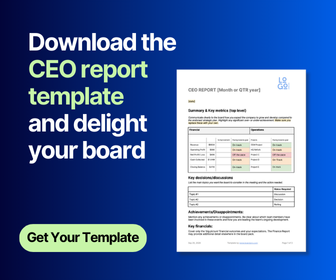Board papers provide essential information for board meetings, detailing agenda items and decisions to be made. They also serve as a record-keeping tool. Board papers are also crucial for board efficiency, so they need to be easily digestible and provide a clear framework for meetings.
This article explores ten tips for writing more effective board papers.
You'll learn how to
1. Focus on tone
To determine the tone of a board paper, ask yourself questions such as:
- Why am I writing this document?
- Who is it for?
- What information do I need to include?
- What does the board need to know, consider or understand?
- What is the focus of the document? Is it for information, decision, or action?
This will help to direct your content and the type of language you use. In addition, to help directors easily consume and interpret information, ensure consistency across all board papers, even when multiple authors are involved. This is especially important when directors need to switch between documents.
2. Use simple language
Overuse of jargon can do more harm than good, decreasing the value of important information and diverting attention from crucial details. Each director brings a certain knowledge to the table, and may or may not be familiar with any complicated or industry-specific terms and acronyms. Marketing specialists may not be knowledgeable about niche financial terms; financial experts may not know about marketing specifics. All directors need to understand the content of board papers, so keep the language universal and easy to comprehend.
3. Only include relevant information
Board papers are designed to provide the board with a clear understanding of the meeting's framework and agenda. Writers should focus on governance matters and other information relevant to board members.
Board meetings typically take place within a limited time. Therefore, directors need to follow the agenda closely. Their aim is to present all required information, discuss choices and make adequate decisions. When preparing board papers, the goal is to keep them short, sweet and concise.
If you can give your board the right information in the right way, they can make the right decisions.

Julie Garland McLellan
Founder and CEO - Director's Dilemma
4. Avoid creating the management report
Directors should not concern themselves with the operations of the organisation and therefore do not need day-to-day reports of the running of the organisation. There, however, is a fine line between operations and strategy. Governance and management need different data to perform their jobs effectively, but it’s important not to recreate the management report whilst writing board papers.
5. Use evidence to support statements
It is important to remember that readers of the board papers do not always share the same depth of knowledge as the writer. Facts and evidence back up persuasive statements and assure the readers of the paper of the claims made.
6. Align content and strategy
In the eyes of a board, strategy and risk are to be assessed together. Once a strategy is proposed, the project needs to be aligned, including a strategic pipeline, to honour the final decision.
"In order for you to properly prepare for your board papers, it's absolutely essential that you understand what your board does and why strategically your board needs a particular paper right now," says Julie Garland McLellan. She suggests that before even opening up your laptop and putting a finger on the keyboard, think about what's going on for the organisation, and what decisions it needs from your board. This will really help you write your paper at the right level," says Garland McLellan.
"Once you've thought through the strategic purpose of the paper, then it's important to think again from the point of the view of the board. What is the context for this paper? What is going on that the board is aware of and should be aware of? What information do they need that is not particularly the topic that you're writing about, but that helps your board to put that topic into a context so that they can make good strategic decisions about it.
It's really important to understand the strategic context and then understand the board's context."
7. Give content a clear structure
Clearly present the content in your board papers. The board needs to look at the board papers and know immediately what is going on and what needs to be said and done. Once a style is set, it should be kept for all future documents. This includes structured layout and house style, like colours, logo and branding.
To keep your board paper engaging and accessible, Garland McLellan suggests aiming for a logical flow that balances narrative with visual and structural variety. Use bullet points and graphics thoughtfully to maintain attention and improve clarity.
Structure tips:
-
Combine paragraphs with dot points to vary pacing and hold interest.
-
Bullet points don’t require full sentences—clarity is more important than strict grammar.
-
Avoid dense text; use white space, images, or charts to break it up.
-
Use one idea per graphic—avoid cramming too much into one image.
-
Graphics should clarify, not confuse—if it needs explanation, it’s not helping.
-
Charts must have legible labels/scales, or be marked as illustrative if not needed.
-
Ensure visual elements are high contrast, effective in black and white, and accessible to readers who are colour-blind.
8. Keep it positive (where appropriate)
Keeping board papers simple, concise, and relevant to the readers saves time.
Think also about the language you are using. Limit he use of negatives, such as don't, isn't, not, says Garland McLellan, and see if you can rewrite those sentences to take a negative word out and tell the board what you want, and what is happening—rather than what you don't want and what is not happening.
Boards need a little bit of story. We need narrative. We need to understand. We like things to make sense.
9. Edit for clarity and impact
In light of keeping the board papers concise, accurate and relevant, the writer should be keen on editing them. The writer needs to ensure enough time to write the paper. They should start by adding any relevant information to do so with the Board, decisions, risks and opportunities. Then, once done, they should step back and review it at a later date so as to pick out anything irrelevant. Editing should be done until the information is to the point and as clear as possible.
To ensure board papers are concise, accurate, and relevant, it is necessary to edit the board papers. Start by allocating ample time for writing and include all pertinent information related to the board, key decisions, risks, and opportunities.
Once the initial draft is complete, step away from it. Review it later with fresh eyes to identify and remove any irrelevant details. Continue editing until the information is sharp, to the point, and crystal clear.
Some board management solutions enable you to update the board pack if you need to make late changes to your board pack, such as adding an amended document. With BoardPro's Board Pack Builder you can easily make edits in your board paper before the meeting, then republish them so they're live for the board to read.
10. Peer review
There is great value in feedback from peers. Peers can help as a fresh set of eyes, especially if it is the writer's first time. There is often a range of board paper-writing experience across board members, so enlist their skills and expertise.
Improve your board meeting efficiency
BoardPro’s free, 6-part webinar series features six governance professionals sharing real-world insights to help transform board meetings into productive and strategic sessions. The series gives CEOs and board members the skills to lead impactful meetings—sign up to the series here.
Meet the expert
Julie Garland McLellan FAICD | FGIA
Julie Garland McLellan is the Founder and CEO of Director's Dilemma. She has over 25 years’ experience working with leading institutions to deliver director education and has undertaken numerous governance evaluations and board reviews across a wide range of companies and sectors.

Share this
You May Also Like
These Related Stories

The problem with board packs and what to do about them

Writing a CEO Report That Delights Your Board + Report Templates


.png?width=1914&height=989&name=Republishing%20the%20Board%20Pack%20(1).png)

